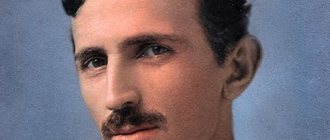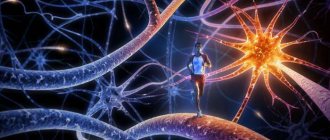Develop Emotional Intelligence
When we are upset, stressed or angry, resistance between two systems begins in the brain. This internal struggle prevents us from concentrating on a specific action, since the mind is busy resolving negative emotions, and a lot of energy is spent on this. But any emotional reactions can be controlled and managed. To do this, you need to develop emotional intelligence. In the free online course “Emotional Intelligence” you can see detailed instructions with which you will learn to understand your emotions.
Meditation
There are many different meditation techniques, but let's focus on the most seemingly simple one - sit in silence with your eyes closed, focusing on your breathing. Even such a seemingly simple exercise can cause a lot of obstacles. For the first time, it will be extremely difficult to sit for even a minute without annoying thoughts overwhelming your consciousness. However, by gradually stopping your stream of consciousness and returning to your breathing, you will help your brain reset. Daily practices help to get rid of anxiety, reduce the impact of stress and learn to control attention.
Research shows that those who practice meditation every day have a thicker layer of gray matter in precisely those areas that are responsible for attention and psychological flexibility. Training your brain through meditation means that over time you need to put less and less effort into focusing your attention. This means that over time it will become easier for you to concentrate in everyday life when it is necessary - for example, at an important meeting or taking an exam.
Get ready to develop your mental abilities
Our attitudes influence our actions and perceptions. When we decide to thoroughly improve our skills, it is easier for us to get ready for work, form new habits and follow them. If we don’t want to or we simply don’t have the mood to do anything, then the learning process will be slower and less productive. Before you start exercising, think about why you need to make such efforts and what it will lead to.
Take online courses for free and discover new opportunities Start studying
THAT for the brain. When to start?
When does the brain begin to age? How to maintain productive mental activity and brain health into old age? Is it really possible to “train” the brain?
Some facts
There is evidence that the loss of a certain part of the brain tissue occurs after the age of 20. After 60, the speed of this process increases. However, in many cases we do not notice these changes - especially at a young age. And in older people, cognitive impairment is also not always observed.
LOSS OF A CERTAIN PART OF BRAIN TISSUE OCCURS AFTER THE AGE OF 20
Among other things, this can be explained by the fact that the number of cells in the brain is built up with a “reserve”, so that age-related losses should theoretically have no effect on either memory or intelligence.
Read the material on the topic: How did Albert Einstein's brain work?
But why then does this happen?
"Tell me who your friend is and I'll tell you who you are"
What affects brain performance? Our lifestyle plays an important role in the health of our biocomputer.
Dietary patterns with excessive consumption of fatty foods, prolonged stress, suboptimal daily routine, work and rest (in particular, lack of sleep) contribute to the development of atherosclerosis. What happens with this disease? Plaques that form in the vessels of the brain (and not only) lead to a decrease in the flow of blood into it. As a result, the capabilities of the intellect, memory, activity, and ability to orientate change.
Factors such as polluted air and water, chronic illnesses, smoking, and consumption of alcoholic beverages and drugs also negatively affect the brain.
Alzheimer's and Parkinson's diseases play an important role in the dysfunction of the brain and the deterioration of its abilities.
Read material on the topic: And the president is powerless before her... Alzheimer's disease of Ronald Reagan
A comfortable chair and physical inactivity, tasty but useless (or even harmful) food, a feverish need to achieve success at any cost (“Definitely, vanity is my favorite sin” - remember Al-Pacino’s character from “The Devil’s Advocate”?) - “ “friends,” these are, frankly speaking, false. But if you know them by sight, you can do something, right? What else can help?
What is used develops
To develop and maintain our muscles in good shape, we engage in physical exercise. In general, this principle applies to the brain: progress occurs when it is trained.
The reader may argue that his head is constantly working: news, analysis of what he sees and hears. But we also go regularly - for example, to a store 5 minutes from home. Does this make our body stronger and our heart healthier? It is unlikely to be so noticeable - most likely they remain in their previous form. In addition, over time, age-related changes begin to have an effect.
An approximate analogy can be drawn with the brain. When does it actually develop? Since our birth. School and university are stages of life’s journey when high demands are placed on it. He cannot help but answer and... becomes different. What happens next? And then we largely use what we have learned. But this is the case when regular learning new things no longer occurs.
Read material on the topic: Bill Gates and his brain
So what is good for our brain? How to maintain and develop memory, thinking, attention? If exercise is for muscles, why shouldn't it be for our supercomputer? And this is actually true.
Analyze your work and home habits. And then learn a skill that you don’t have.
STUDYING A FOREIGN LANGUAGE IS ONE OF THE MOST USEFUL EXERCISES FOR DEVELOPING YOUR BRAIN
When was the last time you used a foreign language? For communication, reading, watching movies? For a long time? Return to a foreign language and, if possible, never part with it again. If you achieve success in one language, move on to another, from the same or a completely different language group. English, Chinese and Arabic will make your brain function differently, even though they are all languages.
Do you know how to play a musical instrument? Maybe you dreamed? Start making your dream come true.
In addition to playing the violin, the famous Mr. Sherlock Holmes played excellent chess. Do you like this game too? Or do you prefer the East with its Go? Crosswords and puzzles can also keep your brain active.
Do you like poetry? What about reciting by heart? If you also speak a foreign language, then “To be, or not to be: that is the question” might also be something you can do? Try it!
Read books. Don't know what to read? Look for recommendations online.
"Life is motion"
Probably everyone knows this phrase in different versions. Physical activity not only speeds up blood flow in general and in the brain in particular. Physical exercises are used in the rehabilitation of patients whose motor sphere suffers.
You may be surprised, but a specially designed motor program can literally change the functioning of the brain. Yes, that’s right: not only the brain provides you with the ability to move, but the movement itself “backwards”, from the periphery, affects it and its functions.
A SPECIALLY DESIGNED MOTOR PROGRAM IS CAPABLE OF LITERALLY CHANGING THE FUNCTIONING OF THE BRAIN
An active lifestyle also has a beneficial effect on the emotional component: movements calm you down and increase your resistance to stress (but we remember that what matters is not what affects us, but how we feel about it). So the movement is on our side: perhaps it is thanks to it that we will be able to ignore everyday interruptions and be more calm about daily events.
It is important to remember about the right choice of physical activity. So-called aerobic exercise (for example, long walks) is beneficial for the brain. But strength training requires increased accuracy: being exhausting and frequent, it will not bring any benefit. Therefore, in order to choose the option that is right for you, consult with a specialist in physical therapy and sports medicine: among other things, some pathologies may have contraindications for a number of sports and physical activity.
Read the material on the topic: What medical examination must be completed before starting exercise in the gym?
Travel. It doesn't have to be far. Change your environment, including nature. Get out of the city, away from the bustle. Look for sources of positive experiences.
Do you take a certain route to work? Change it. The brain will have to “build” a new map: your spatial memory will thank you.
Unusual advice. Do you brush your teeth with your right hand? If yes, try left. Experiment with other, safer moments.
It's time. What about rest?
The common idea that you can relax by switching from one activity to another is, of course, true. How long have you been reading? Take a walk. But no one has canceled the importance of proper sleep. And if earlier, after a sleepless night, you could quite successfully finish the next school day, then after forty, a full-fledged sleep is an absolute necessity (and normally, always: for this you should not wait until your fortieth birthday).
Read the material on the topic: How much sleep does an adult need?
When you take a break from work, don't do anything that might stimulate your brain. Do not read or listen to material that requires attention. Switching to a similar activity is also not an option. It's better to take a nap or take a walk.
When work is joy
It’s not an easy question, but you need to strive for it. Often a person chooses between “should” and “want”. Don't give up trying to combine these things. Enjoying the process of what you do has its own beneficial effect.
Feed your brain correctly
Yes exactly. Include fish, vegetables and fruits, and cereals in your diet (of course, taking into account food allergies).
Read the material on the topic: Rules for healthy eating. What should you eat to stay healthy?
Get started today
Time only moves in one direction. Therefore, it is better to start something that will benefit you sooner rather than later - it is not at all necessary to wait until retirement (which, according to the latest “optimization” of legislation, will occur for residents of our country at a later age).
Be active, diversify your life, eat right and consult a doctor promptly if problems arise. This will keep your brain functioning well throughout your life.
Text: Enver Aliyev
Other
How to develop speed of thinking through observation and the use of patterns
The speed of decision-making that you observe in your colleagues and which you envy is not always associated with their ability to develop an unprecedented speed of thinking. If a person is engaged in some activity for a long time, he gains experience and develops a whole piggy bank of algorithms and templates. What you need to figure out when “reinventing the wheel” is probably a lesson learned a long time ago for him, and if you need to be creative and unconventional, then he can simply use an algorithm. Believe me, after a while you will have your own “chest” of ideas, algorithms and templates, you just need to take care to remember the solutions you find and put them in a collection, in your piggy bank.
How to develop speed of thinking?
We begin to develop the speed of thinking, which helps us quickly make decisions, quickly find answers to questions, quickly retrieve the necessary information from memory, that is, to put it simply, to think quickly, from childhood. This happens when we develop fine motor skills: sculpting, assembling or disassembling something, playing with small toys, and later playing an instrument or working on the keyboard, using all fingers. In addition to speed, these ways to develop thinking stimulate its accuracy. While we're talking about this, let's remember finger gymnastics, a detailed description of which is easy to find on the Internet. These exercises help coordinate the work of both hemispheres of the brain, improve memory and help develop speed of thinking.
Asian ginseng
A legend of traditional Chinese medicine, ginseng root is recommended for almost any health problem. The pectins, tannins, glycosides, polysaccharides, resins, essential oils, alkaloids, vitamins and microelements contained in it are in amazing harmony, and together have a stimulating, rejuvenating and tonic effect on the body.
Preventive use of ginseng is relevant for reduced immunity, loss of strength after a serious illness, chronic fatigue syndrome, depression, endocrine and digestive disorders, and sexual weakness in men. Ginseng is known to stabilize heart rate and normalize blood pressure. This natural medicine has no contraindications or side effects, however, it is a very powerful stimulant and tonic, so it is recommended to take ginseng in a dosage of no more than 200-500 mg twice a day.
How to develop speed of thinking using the Victor Kotka method. Increasing internal tempo
- To use this technique, which trains the speed of perception and speed of thinking, you need an assistant trainer, a timer and an informative book, preferably a popular science book, on a topic that interests you. You are given time to read the page, for example 3 minutes. then they give the task to do it in 2.5 minutes. It gets more difficult, but you manage. Then you are given 2 minutes. you already have to “speed up”, but you manage. Then you are given 3 minutes, and you feel how much it is. Next task - 2 min. - it is possible, but with difficulty. One and a half minutes - it’s very difficult for you. Then 2.5 - after one and a half it’s easy for you, then 2 minutes, but in seconds: 120 seconds, then 100 seconds. etc. After a few months of such training (no need to force it too much), you will learn to “grasp” the content of the page text in a short time (a few seconds). Testing the assimilation of the text read is carried out by retelling.
Don’t let self-doubt and fear that you won’t succeed interfere with you: the one who walks will master the road. Just do it, try it and believe in yourself.
(Reference: Victor Kotok is the author of an original method of teaching dynamic reading. As his fellow student at the Faculty of Psychology of Moscow State University, the popularizer of practical psychology N. I. Kozlov (Doctor of Psychology, professor and founder of Training-) studied using this method and speaks of it as very effective.)
- You can increase your internal tempo, that is, increase your own internal speed, in this way: prepare a timer and try to come up with and pronounce as many noun words in 1 minute. Have someone help you count how many words you can remember. Try it, practice more often, try to “speed up” and name more and more words per unit of time.
- Speed up the pace of your walking, speaking, making decisions (even if they are wrong). Try changing the tempo, either speeding it up or slowing it down. Feel it, it will help you control it. In general, consciously slowing down and speeding up the pace at which you perform any action (for example, talking, walking, drawing, and so on) helps the brain learn to work at different tempo rhythms and, if necessary, speed up.










